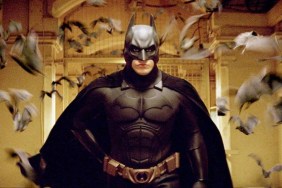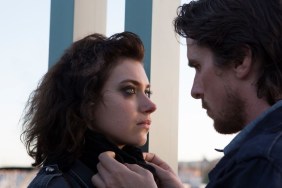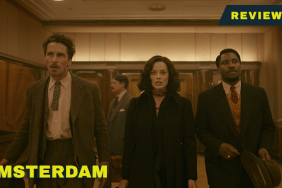
6 out of 10
Cast:
Christian Bale as Rick
Cate Blanchett as Nancy
Natalie Portman as Elizabeth
Brian Dennehy as Joseph
Antonio Banderas as Tonio
Freida Pinto as Helen
Wes Bentley as Barry
Isabel Lucas as Isabel
Teresa Palmer as Karen
Imogen Poots as Della
Peter Matthiessen as Christopher
Armin Mueller-Stahl as Fr. Zeitlinger
Cherry Jones as Ruth
Patrick Whitesell as Agent #1
Rick Hess as Agent #2
Michael Wincott as Herb
Kevin Corrigan as Gus
Jason Clarke as Johnny
Joel Kinnaman as Errol
Clifton Collins Jr. as Jordan
Nick Offerman as Scott
Jamie Harris as Burglar
Lawrence Jackson as Burglar #2
Dane DeHaan as Paul
Shea Whigham as Jim
Directed by Terrence Malick
Knight of Cups Review:
It should surprise no one that Terrence Malick’s (The Tree of Life) latest film, Knight of Cups, is a philosophical rumination about the pain and loneliness of life and how it increases the further we get from nature. What should surprise (depending on your point of view of his last several films anyway) is the degree to which it feels like a parody of his own work, descending into many of the ticks for which he has become known in his later career. Actors wander around picaresque settings, looking off into the horizon and occasionally speaking to each other in partially-heard exchanges while descending further and further into their own only partially-understood thoughts. It’s a feeling which is intensified by his choice to ensconce his film in Hollywood, using the decadence of the moviemaking scene as the most obvious focal point yet for his ruminations on materialism as distance from God. In Cups, that distance is encapsulated in Rick (Bale), a screenwriter who, despite all the earmarks of worldly success, finds himself more and more isolated from the world symbolized primarily by the many disastrous romantic relationships he has left behind him.
It could almost be satire except for the fact that satire and dreamlike imagery do not go hand in hand together. But even separate from the Hollywood backdrop, this is not a particularly novel foundation for a character piece, it’s been pretty popular since at least The Sorrows of Young Werther and make up at least 60% of indie dramas in any given year. But the pull of Malick films has never been their textual complexity – the plot of most can be summed up in about a sentence and tend to offer little in the way of conflict or resolution – but in the way they are told. The medium really is the message as he cuts away the classic threads of narrative structure or character development and presents, instead of something immediate and now, the memories of an older individual cast back on their life. Scenes play out not with a beginning, middle, end but as a series of middles flowing one into another – strong moments and words are remembered, but the context tends to be hazy and unsure. It’s a technique he’s used frequently but usually attached to some sort of narrative (simple though it may be) such that you can see the outline even if you aren’t shown the whole. There is no such underlying anchor (however well hidden) to Knight of Cups, leaving it frequently detached and floating through the air like dandelion spores.
It is beautiful to look at, though. Cinematographer Emmanuel Lubezki (The Revenant) does dreamlike like no one else and even if the moments feel familiar for frequent Malick watchers, they still have a personality all their own. The actors are game for the moment as well, particularly Bale who is saddled with the added weight of not being allowed to speak as he watches and reacts to his own life. It‘s an interesting idea but one which leaves our point of view character a cypher, one we may be expected to place ourselves into but without any reason to do so. Some of the actors are able to break free of these constraints – Michael Wincott is dazzling in literally 30 seconds of screen time which remind what a great conventional filmmaker Malick can be – and some can’t at least partially due to the nature of their setups. Many of the women Rick encounters are ill-explored half-remembered dreams who cannot help but vanish and be replaced and offer little weight, and an ongoing family drama about Rick’s wastrel brother (Bentley) and his complicated relationship with his father (Dennehy) suffers from the same problem. It is the rare instance where both the emotionally real and the dreamlike are able to come together at the same time that Knight of Cups manages the depths to which it aspires. The most notable version comes during the occasional visit to the studio backlot where Rick works, an obviously fake and empty world which exemplifies Malick’s view on Hollywood (and probably modern civilization in general) where Rick and his ex-wife (Blanchett) try to figure out why their marriage failed amid the most obvious of reasons.
It is, ironically given Malick’s own stylistic choices, fleeting at best. There’s still a lot to take away from Knight of Cups, particularly on the big screen, but much of the sales pitch for Malick’s films was that they were pretty films that were more than pretty films. And in Knight of Cups, he does not live up to that challenge.
Knight of Cups
-
Knight of Cups

KoC-03190_R_CROP(l to r) Christian Bale stars as ‘Rick’ and Cate Blanchett as ‘Nancy’ in Terrence Malick's drama KNIGHT OF CUPS, a Broad Green Pictures release.Credit: Melinda Sue Gordon / Broad Green Pictures
-
Knight of Cups

KoC-16057_R_CROP(l to r) Natalie Portman stars as ‘Elizabeth’ and Christian Bale as ‘Rick’ in Terrence Malick's drama KNIGHT OF CUPS, a Broad Green Pictures release.Credit: Melinda Sue Gordon / Broad Green Pictures
-
Knight of Cups

KoC-09388_R(l to r) Christian Bale stars as ‘Rick’ and Freida Pinto as ‘Helen’ in Terrence Malick's drama KNIGHT OF CUPS, a Broad Green Pictures release.Credit: Melinda Sue Gordon / Broad Green Pictures
-
Knight of Cups

KoC-17622_RAntonio Banderas stars as ‘Tonio’ in Terrence Malick's drama KNIGHT OF CUPS, a Broad Green Pictures release.Credit: Melinda Sue Gordon / Broad Green Pictures
-
Knight of Cups

KoC-03820_R_CROP(l to r) Christian Bale and Cate Blanchett filming on the beach with Cinematographer Emmanuel 'Chivo' Lubezki for Terrence Malick's drama KNIGHT OF CUPS, a Broad Green Pictures release.Credit: Melinda Sue Gordon / Broad Green Pictures
-
Knight of Cups

-
Knight of Cups










